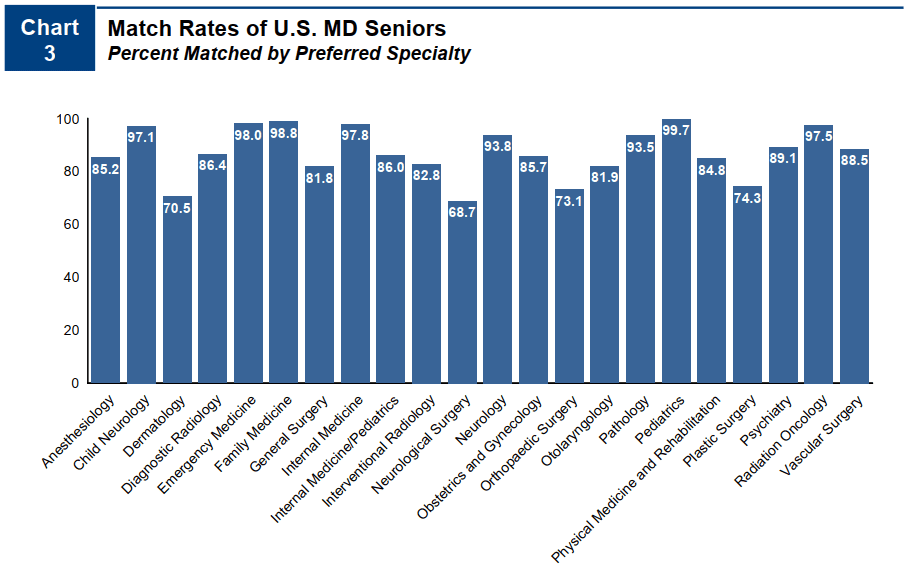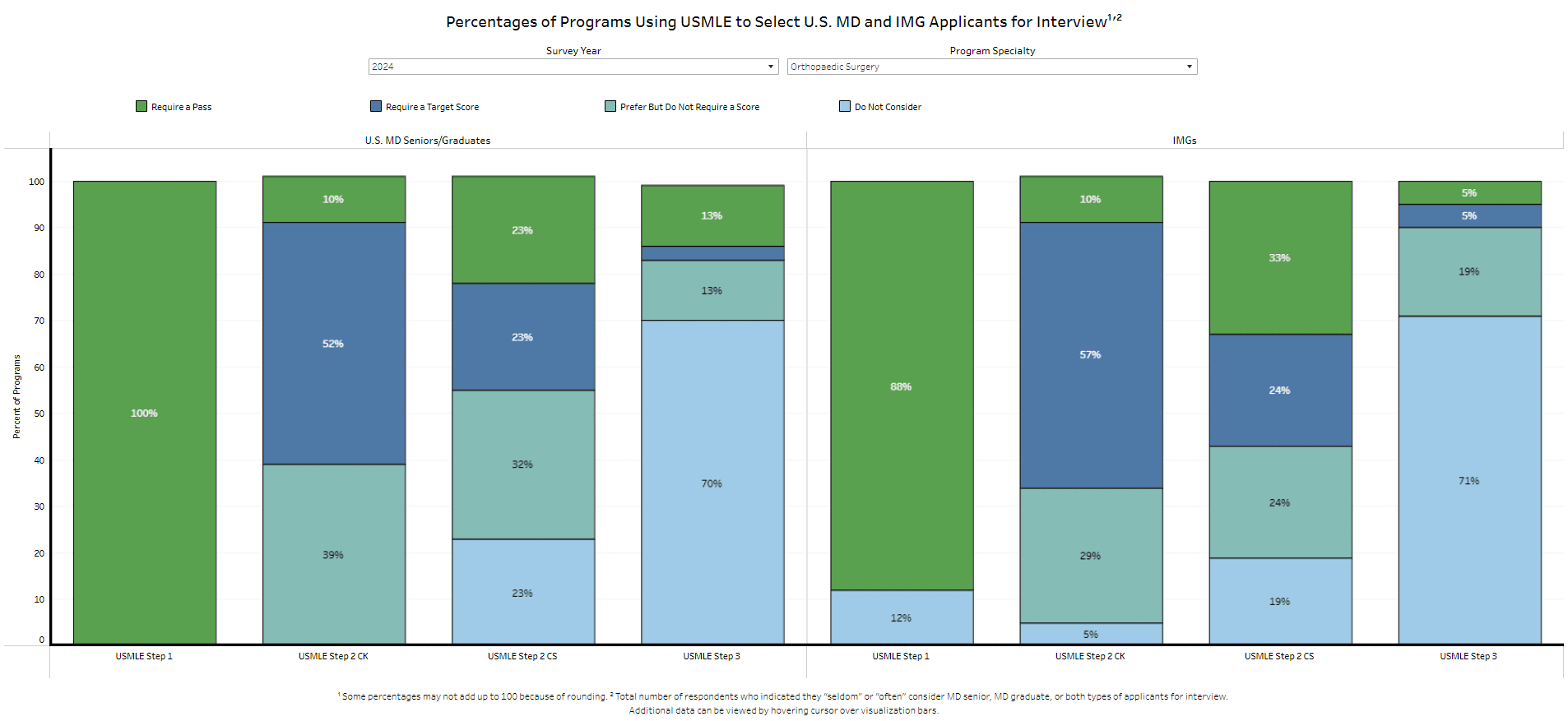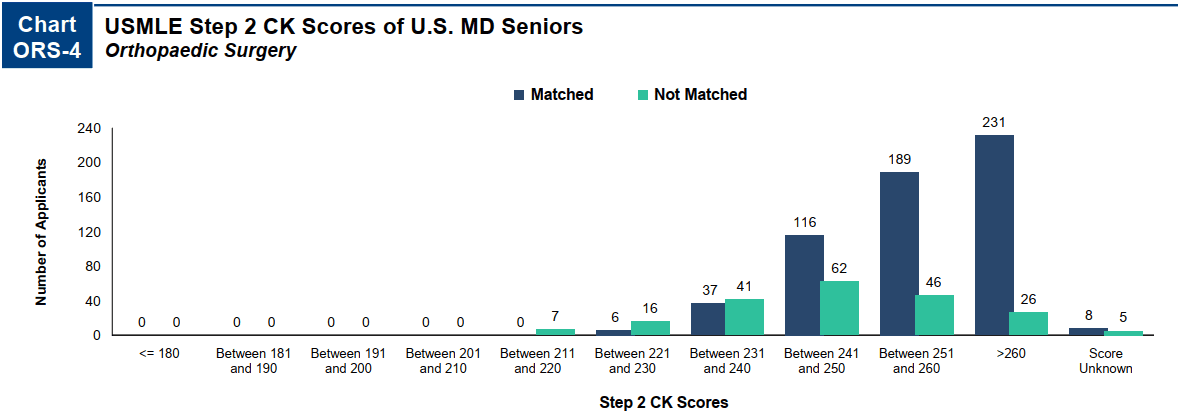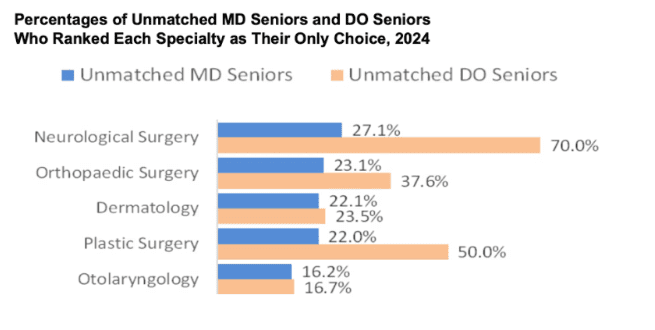Matching Into Orthopedic Surgery Residency

27872 Views
This blog post was originally posted on October 19th, 2019, and updated by Dr. Marisa Ulrich in October 2024.
Orthopedic surgery is a competitive specialty, and recent ERAS and NRMP changes have left many questioning how to best approach their residency applications. Below, we outline tools and methods of evaluating your application to ensure you are as competitive and prepared as possible.
The NRMP conducts a biennial survey to determine what factors Program Directors consider when selecting candidates to interview and rank for their orthopedic surgery residency program. The 2024 NRMP results were compiled into an interactive tool, which is extremely helpful in gauging where your application stands in the applicant pool, and whether matching into an orthopedic surgery residency program is realistic.
This tool can help applicants determine whether adding additional components, like a letter of recommendation (LOR) in the specialty, could give them a leg up as programs review your application.
The interactive table tool can be found here, and we recommend taking a look at the specialty you’ll be applying to before submitting your ERAS packet. We have also included the NRMP Main Match Results 2024. As well as the AAMC ERAS Statistics for 2024.
As you may already know, orthopedic surgery residency is very competitive to match into, and continues to get more competitive.
Over the past five years, increasing numbers of medical students are applying to the specialty. Additionally, they are submitting some of the highest numbers of applications on average.
For Orthopaedic surgery residency applicants, major components of the application you should pay attention to include:
Selection Criteria for an Interview
With Step 1 now pass/fail, Step 2 is now the MAJOR objective factor. Having an appropriate LOR in the specialty, significant research experiences and high class ranking are also highly recommended.
Step 2 – Score
- 235-250 seems to be the minimum threshold at which programs will grant interviews.
- Scores below 230 generally will place you in an unfavorable position to receive an interview.
- Now that Step 1 has been changed to pass/fail, it is essential you do well on Step 2. This is one of the only remaining objective measures by which programs can compare applicants.
Failing Step 1 or 2 is more likely to be a showstopper
According to the 2020 program directors’ survey, 82% of orthopedic surgery programs will NOT consider you if you’ve failed Step 1. Additionally, 71% will NOT consider you if you’ve failed Step 2. This question has not been asked in subsequent program directors’ surveys, but the information is likely still accurate. Take a look at our blog post about addressing red flags if you have a failure on your application.
So, if you’ve failed an exam, you can still apply. But you may consider applying to a second residency or having a backup plan should you not match the first time.
More emphasis is being placed on research experience and productivity.
This is represented by the number of research “abstracts, presentations, and publications” between applicants who matched and those who went unmatched in 2024—23.8 versus 18.0, respectively.
“Signaling” on ERAS can help applicants indicate their top 30 priority programs.
While the majority of residency programs are still determining how to best interpret the signaling functionality on ERAS applications, when comparing similar applicants, the presence of a “signal” is more likely to deliver the applicant an interview.
With orthopedics currently rated the least diverse medical specialty, applicant gender, race, ethnicity, and experience, are increasingly being valued.
Thus, consider ditching the story about how you tore your ACL in high school. Instead, write about an experience that makes you unique in that personal statement!
Types of Applicants Considered:
- International Grads (U.S. and non-U.S.) are more likely to have difficulty matching into orthopedic surgery: According to the NRMP 2024 director’s survey, there are few programs that consider interviewing or ranking non-U.S. IMGs on a routine basis.
- About 64% seldom consider U.S. IMGs for interviews, and 36% never consider a U.S. IMG for an interview or rank.
- If you are a non-US IMG, the chances are even lower, with 52% of programs never considering such an applicant. We recommend doing your homework to determine which programs may even consider IMGs. We also definitely recommend a backup specialty to apply into.
- Osteopathic graduates have a chance to match into orthopedic surgery: 48% of programs will routinely interview and rank DO applicants, while 12% of programs will never interview or rank a DO applicant.
- However, over the past five years, recent research has found a decrease of nearly 5% in the total number of matched spots for DO applicants. As a larger emphasis is placed on medical school accreditation status within the specialty. This trend may continue to worsen for non US MDs (1).
- Therefore, it is very important to do your research to identify these programs so that you can best increase your chances of matching.
Interviews for Matching into Orthopaedic Surgery Residency:
- Once you get an interview, ranking is based primarily on your interview and interpersonal skills.
- This means, forget about your numbers. Focus on demonstrating who you will be as a coworker and future resident in the program.
- Interviewees Get Ranked!: If you get an interview invitation, you are likely to end up on the rank list if you interview. We recommend ranking at least 11 programs. So once you receive 11 interview invitations, you can start to prioritize and cancel as you receive more invites.
- Expect to receive interview invitations in November: 50% of the interview invitations will be sent out in November, and over 20% will be sent out in October and December.
- Expect to interview in December/January: Only 13% of interviews will occur before December, which gives you ample time to prepare. More than 50% of your interviews will occur in January or later. For further discussion on how to prep for your interview, see our blog post on how to Crush your Residency Interview: https://elitemedicalprep.com/preparing-for-your-residency-interview/
- Don’t expect to get your top rank choice, so ensure you are happy with your rank list from #1 through #7
- In a recent 2023 survey of orthopedic residents who matched, only 34% matched at their top choice program, while 40.8% matched at their fourth or lower ranked program (2).
After you’ve browsed your specialty, take a look at a few other specialties and note what’s NOT important for Orthopaedic Surgery:
- MSPE/Dean’s Letter isn’t particularly important in Orthopaedic surgery
- Personal statement isn’t particularly important for Orthopaedic surgery
- Interest in a specific residency program isn’t as important in Orthopaedic surgery as in other specialties
Summary for Matching into Orthopaedic Surgery Residency and ERAS Applications:
- A solid orthopedic surgery application would include a 250+ on Step 2, very strong LOR from orthopedic surgeons, a minimum of 14-16 research publications, and a strong performance on away rotations.
- Orthopedic surgery is not IMG-friendly, but it may be possible to match as an IMG if you do your research to identify programs with active IMG residents and establish proper connections.
- If you’ve failed an exam, you can still apply in Orthopaedic surgery, but you should apply for a back-up specialty.
- Expect Interviews in December-January. Reach out to programs you have high interest in if you haven’t heard from them by mid-December. Once you have about 12 interview invitations, you can consider being a bit more selective about which ones you actually take (but not before). And make sure you are happy with your rank list through rank #7, given the majority of orthopedic surgery residents do not get their #1-3 preferences even when they match!
Good Luck! ☺
If you need further or specialized assistance understanding which residency specialties you are best suited to apply to, you can contact us or visit our residency advising page to learn more about Elite Medical Prep residency advising services.
- White, Peter B. DO, MS; Giordano, Joshua R. DO; Chen, Matthiew BS; Bitterman, Adam D. DO; Oni, Julius K. MD; Zacchilli, Michael MD; Poon, Selina C. MD, MPH, MS, FAOA; Cohn, Randy M. MD. Residency Match Rates in Orthopaedic Surgery Based on Sex, Under-Represented in Medicine Status, and Degree Type. JBJS Open Access 8(1):e22.00143, January-March 2023. | DOI: 10.2106/JBJS.OA.22.00143
- Imbergamo, Casey MD; Sequeira, Sean MD; Pizzo, Dane MS; Wright, Melissa MD; Boucher, Henry MD. Where Do Orthopaedic Surgery Applicants Match on Their Rank Lists? A Survey of Incoming Residents. JBJS Open Access 8(1):e22.00089, January-March 2023. | DOI: 10.2106/JBJS.OA.22.00089
Featured Articles








